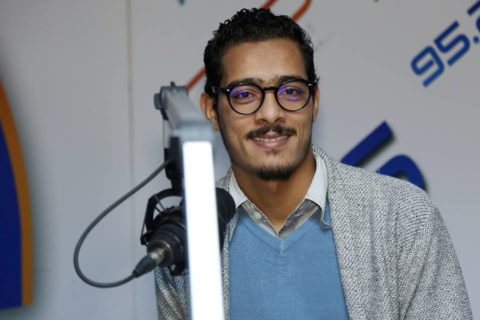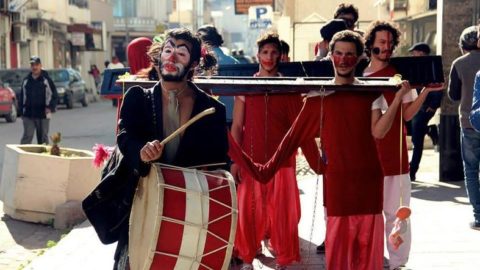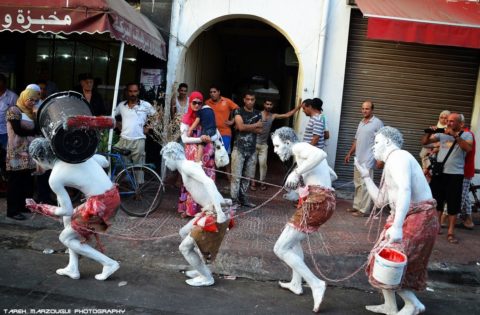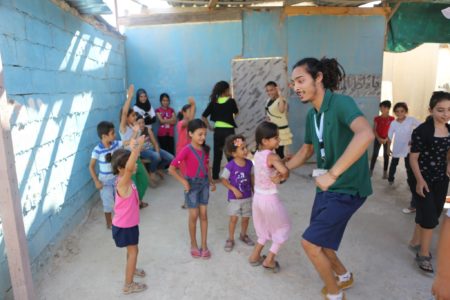Indra in Tunisia
Seif Eddine Jlassi – Fanni Raghman Anni
A year or so ago I was privileged to be invited by our colleague Marina Barham, of Al Harah Theatre, to attend and speak at the first Palestinan Performing Arts Network (PPAN) conference in Ramallah. Whilst there Marina brought to my attention a young man from Tunisia, Seif, who was also a speaker at the event and encouraged me to invite him join the network of The Indra Congress. When I heard Seif speak I instantly agreed with Marina’s suggestion: Seif’s spoke passionately about his pioneering creative work with marginalised young people in Tunisia in a way that resonated powerfully with the vision and aspirations of Indra, so I invited him to join with us.
Those of you with a nose for history will be aware that Tunisia was the home of the ancient city of Carthage and, because of its closeness to shipping routes in the Mediterranean, its strategic importance led to conquest by the Romans, Arabs, Ottoman Turks and the French – who ruled Tunisia as a colony until 1956. The country was led by Habib Bourguiba for 30 years until President Ben Ali replaced him and continued ruling in an authoritarian manner for several years.
In 2011 an unemployed student, Mohammed Bouazizi, could stand his oppression no longer. In order to make a minimal living, Mohammed had begun working as a street vendor, in which capacity he was subjected by the police to constant harassment and humiliation.One final incident pushed him to despair and he set fire to himself. His despair resonated with many people and led to major street protests and extensive demonstrations, which gatheredsufficient momentum to force President Ali from office and initiate the ‘Arab SpringRevolution’ across the wider Middle East region.
Tunisia today faces major challenges to its stability; dealing with major social and political changes, war to the east and pressure from jihadis on all sides. Political reform has not delivered major economic benefits to the rural south and in the cities many people still feel left out. Youth unemployment is excessively high and a worrying number of young people have left to join Isis in Syria and elsewhere. But there is also an alternative groundswell of creative and political energy emerging from young people and artists who see the performing arts as a vehicle through which they can express their hopes, fears and aspirations in the streets and public spaces.
Siefeddine Jlassihas become a leading figure in this movement. He is an applied arts practitioner and social activist who, after graduating from Tunis Institute of Fine Arts is a Master Researcher at the Higher Institue of Dramatic Art in Tunis. Seif is A member of the United Nations Youth Advisory Council and is a member of the strategic planning committee of the ‘Ahd’ campaign for civic culture under the supervision of the Arab Institute for Human Rights. Seif is also President of ‘Fanni Raghman Anni’ Association for street arts.
‘Fanni Raghman Anni’ is an independent cultural association that seeks to reclaim the Tunisian street as an open, free space for political, artistic and cultural expression and through the training and development of the artistic capacities of young people, especially in marginalised neighbourhoods.
In their own words, ‘We support and develop the local talents of young men and women, give them the opportunity to create a cultural space in their communities, making it possible for them to pursue the fight for their rights and for the eradication of all forms of exclusion.
Besides Seif’s work in the streets and open spaces in Tunisia, he has been involved extensively in performance and training programmes in the refugee camps of Jordan, Syria and Lebanon.
I think Seif and his colleagues would have much to share with participants in the Indra Congress and we warmly welcome him and his group into the net of Indra and look forward to hear more of their inspirational work.
David
May 2019



